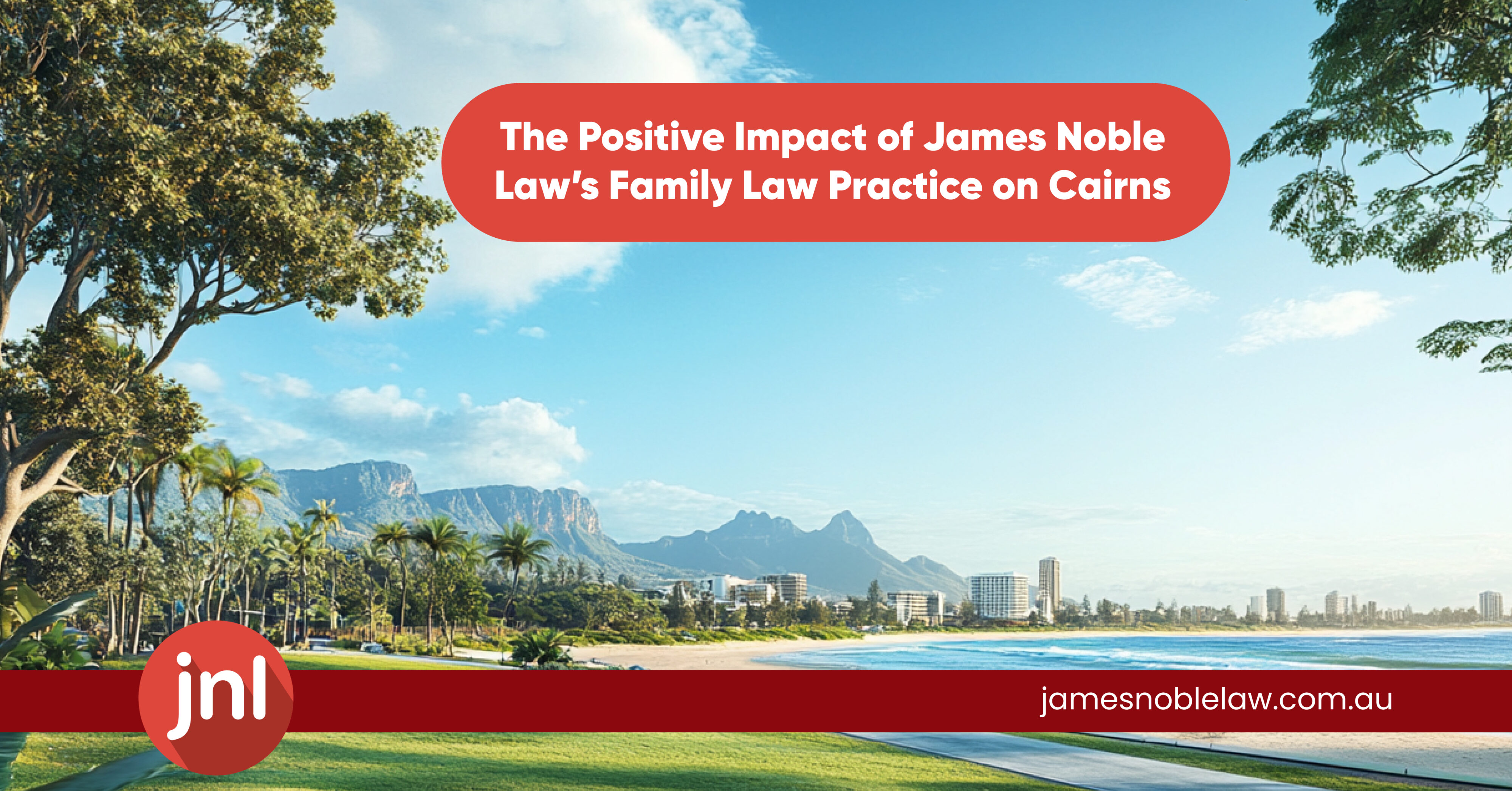Latest blog posts
Breaking Free: How to Safely Leave a Domestic Violence Relationship in Queensland
Leaving a domestic violence (DV) relationship is one of the bravest and most life-changing decisions a person can make. At James Noble Law, we understand the fear, uncertainty, and overwhelming logistics that come with this step—especially when children and property are involved. Based in Queensland, we’re here to help guide you through this complex process with compassion, clarity, and legal expertise. Whether you’re in Brisbane, the Gold Coast, or regional Queensland, you have rights—and you are not alone. Understanding Domestic...
Read More
Facing Separation: Navigating the Complexities of Children, Property, and Wills with James Noble Law
Separation is never easy, and when your partner seeks a separation, it can feel like the ground has been pulled out from under you. Whether it’s how to tell your children, divide property, or update your Will, the emotional and legal aspects of a separation can be overwhelming. Thankfully, there are steps you can take to ensure that you handle the situation with clarity, confidence, and with the support you need. James Noble Law is here to guide you through...
Read More
Finalising Your Property Settlement: Financial Agreement vs Consent Orders – Which Path is Right for You?
Considering separating from a partner is never easy—and dividing assets and property can be one of the most complex and emotionally charged parts of the process. Whether you’ve already agreed on how to divide your finances or you’re still working through the details, it’s crucial to legally finalise your property arrangements or settlement to avoid future disputes. Understanding the differences between Financial Agreement vs Consent Orders is essential to making informed decisions and ensuring long-term peace of mind. At James...
Read More
Court Forms Without the Chaos: James Noble Law Takes the Complexity Out of Family Law
When Paperwork Feels Like a Legal Minefield If you're in the middle of a family dispute, separation, or child custody matter, chances are you're already feeling emotionally drained. Then come the court forms— filled with unfamiliar language, legal traps, and intimidating deadlines to overwhelm even the most organised person. But you don’t have to face it alone. Having a trusted family lawyer by your side isn’t just about legal advice—it’s about peace of mind. At James Noble Law, we help...
Read More
Why Financial Agreements in Australian Family Law Seem Expensive — And Why They’re Worth It
"Peace of Mind Over Price: Why Financial Agreements Are Worth the Cost with James Noble Law" Financial agreements in Australian family law—such as Binding Financial Agreements (BFAs) made before, during, or after a relationship—often appear costly. However, these expenses reflect the level of legal precision and protection involved. When compared to cheaper alternatives that can be easily overturned, a properly prepared agreement is a smart and lasting investment. There are several reasons why these agreements cost more than many expect:...
Read More
Planning Love and Life: When a Binding Financial Agreement is the Right Choice
When you’re in love or building a life with someone, the last thing you want to think about is a breakup. But just like insurance, estate planning, or a will, a Binding Financial Agreement (BFA) is about preparing for the unexpected. In Australia, BFAs are a legally binding way to define how your property, finances, and debts will be divided if your relationship ends. And while they’re often associated with wealth or celebrity divorces, they’re becoming increasingly common—and useful—for everyday...
Read More
Love, Money, and Legal Lines: What Aussies Are Asking Now About Financial Agreements
In today’s world of complex relationships, blended families, and evolving financial landscapes, more Australians are turning to financial agreements to protect their interests and avoid lengthy court disputes. Commonly known as Binding Financial Agreements (BFAs), these legal tools allow couples to decide how assets and finances will be managed during and after a relationship. But as society changes, so do the legal questions people are asking. From cryptocurrencies to inheritances, and de facto rights to enforceability—there’s growing curiosity (and confusion)...
Read More
Untying the Knot: Top Divorce Questions in Queensland — Answered by James Noble Law
When facing a divorce, it's completely normal to feel overwhelmed, confused, and even a little lost. In Queensland, the legal process can seem complicated without the right guidance. Thankfully, James Noble Law, one of Brisbane's most respected family law firms, is here to simplify things. Here are some of the most commonly asked questions about divorce in Queensland, along with how the team at James Noble Law expertly addresses each concern. 1. How long do I have to be separated...
Read More
Top 10 Questions to Ask Before Hiring a Family Lawyer — And How James Noble Law Answers Them
When navigating the complexities of family law, selecting the right legal representation is paramount. James Noble Law, based in Queensland, stands out as a trusted firm with over 50 years of experience in family law. Led by Charles Noble and Accredited Specialist James Noble, the firm is renowned for its client-focused and results-driven approach. Here are the top 10 questions prospective clients often ask when considering engagement with a family law firm, along with insights into how James Noble Law...
Read More
Why Alternative Dispute Resolution Must Be Exhausted Before Going to Court in Parenting Matters
At James Noble Law, we understand how emotionally challenging parenting disputes can be. When relationships break down, it’s not uncommon for both parties to have differing views about what is in their child’s best interests. There is a conception within society that courts are the first stop in attempts to resolve issues in parenting matters. This is not the case as before turning to the courts, Australian family law requires that separated parents attempt to resolve their issues through alternative...
Read More
Why James Noble Law is Brisbane’s Best Choice for Your Family Law Matter
"Trusted, Experienced, and On Your Side When It Matters Most" When life throws you a curveball and you find yourself needing a family lawyer, the choice you make matters — a lot. You’re trusting someone with your future, your family, and your peace of mind. That’s why so many people in Brisbane turn to James Noble Law when they need expert, caring legal support. Here’s why they’re considered one of the best in the business: They’re Family Law Specialists At...
Read More
Why You Should Draft a New Will After Divorce and Property Settlement in Queensland
What happens to my will after a divorce?” and “Do I need to update my will after my divorce?” are questions we often receive at James Noble Law. As Divorce is such a life-altering event—emotionally, financially, and legally – it is easy to overlook a crucial step: updating your Will. In Queensland, the law makes certain automatic changes to your Will following divorce—but it doesn’t go far enough. Failing to revise your estate planning documents can lead to unintended outcomes,...
Read More
Understanding Separate Asset Pool Division in Family Law Property Settlements
When a relationship breaks down, dividing property and finances can be one of the most complex and emotionally charged aspects of separation. Questions our Family Law Firm are often asked include: “What happens to my assets that were mine before the relationship?”, “What happens if I have made greater contributions to the asset pool prior to separation?” , and “Is my ex-partner entitled to my assets even if we had a short relationship?”. This is where the concept of separate...
Read More
Navigating care arrangements in the holiday season
While the holiday period often evokes feelings of happiness and excitement, the season can also be daunting for separated families. To avoid the challenges associated with shared care, it is imperative to collaborate with your ex-partner to draft a parenting plan which is clear, comprehensive and child-focussed. Below is a list of tips that may be useful when organising care arrangements during the holiday season. Make plans with your ex-partner well in advance. Early planning can reduce the risk of...
Read More
The effects media attention has given to domestic violence
Political Reaction to the Rise in Domestic Violence The alarming rise in domestic violence incidents has triggered a significant political response, emphasising both legislative reforms and resource allocation. Governments across various levels have taken swift action to address this growing concern, motivated by the intense media coverage and public outcry. Legislative Changes Policymakers have prioritised the issue by introducing stricter laws aimed at protecting victims and ensuring accountability for perpetrators. Legislative reforms include mandatory arrest policies for suspected domestic violence...
Read More
The issue of subpoenas in Family Court proceedings
A subpoena is a legal document issued by the Court at the request of a party to a Family Court proceeding. A subpoena compels a person to produce documents or give evidence at a hearing or trial. The subpoena, which has the effect of a Court order, requires the person to whom it is addressed to produce the documents which it describes. It assumes that the person named in the subpoena document has the ability or capacity to produce the documents...
Read More
Parental alienation in family law
Parental alienation in the context of family law refers to a situation where one parent (or sometimes another caregiver) engages in behaviours that undermine the child's relationship with the other parent. These behaviours can range from subtle to overt and may include: Negative speaking: One parent consistently speaks negatively about the other parent in front of the child, portraying them as bad, unloving, or dangerous. Limiting contact: Deliberately limiting or preventing the child from seeing or communicating with the other...
Read More
Can I request child support if my child has not yet been born?
If you have not yet given birth to your child, you may be eligible to receive child support payments from the other parent of the soon-to-be-child. As a mother, you may be entitled to receive financial support, known as ‘childbirth maintenance’, from the child’s father for some medical expenses from two (2) months before the birth and until three (3) months after the birth. Section 67B of the Family Law Act 1975 (Cth) (“the Act”) contains provisions for childbirth maintenance....
Read More
Caveats and Family Law
When couples separate, it is not uncommon for Party A to be named on title for the family home, while Party B is unnamed, even though Party B made substantial contributions to the relationship. This may be the result of Party A having purchased the home prior to the relationship commencing. If Party A is the sole registered owner of the home, this can pose a risk to Party B post separation, noting that Party A can sell the home...
Read More
The Positive Impact of James Noble Law’s Family Law Practice on Cairns, Queensland
Cairns, Queensland, is renowned for its breathtaking natural beauty, vibrant community, and thriving economy. With the recent establishment and operation of James Noble Law's Family Law Practice in Cairns, this picturesque region stands to gain even more from the expertise and dedication that this legal practice brings. In this article, we'll explore the various benefits that this expansion offers to the Cairns area and its surrounds. Expertise and Experience: James Noble Law is a well-established family law practice with a...
Read More






















